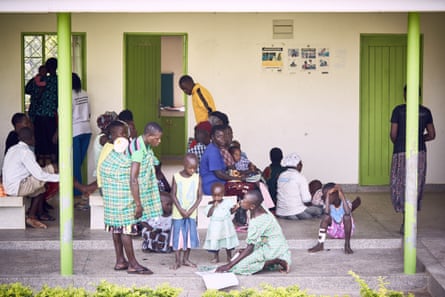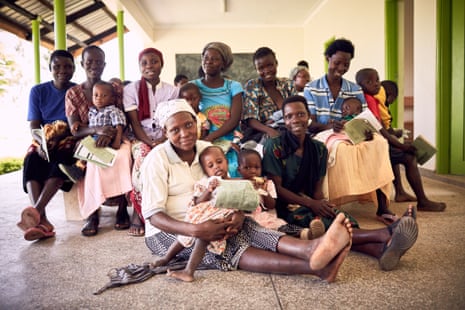Hundreds of thousands of women in Uganda face losing vital reproductive healthcare and advice under Donald Trump’s looming crackdown on international family planning.
The services of Uganda’s largest providers of family planning, cancer screening and antenatal care are under threat after the US president reintroduced the Mexico City policy, otherwise known as the “global gag rule”, in his first week in office.
The policy cuts all US funding to overseas organisations that perform work in any way linked to abortion. Significantly, Trump’s expanded version of the rule also threatens funding cuts across a broad range of healthcare programmes, including Zika, malaria and HIV.
What is the 'global gag rule'?
The rule, otherwise known as the Mexico City policy, requires NGOs to certify that they will not perform or promote abortions anywhere in the world as a condition for receiving US family planning funds. Every Republican president since 1985 has implemented it. But in 2017, Donald Trump adopted a stringent version of the rule, under which NGOs that refuse to sign will be refused all health assistance, including for HIV, primary care, nutrition, tuberculosis and malaria programs. As much as $8bn in US funding could be affected – money that developing world health budgets can ill afford to do without.
Funding for projects implemented by Marie Stopes International Uganda and Reproductive Health Uganda will end in the coming weeks because of the global gag rule.
Both Marie Stopes International (MSI) and the International Planned Parenthood Federation (IPPF), of which RHU is a member, have refused to sign the gag order, saying women will die if it is implemented.
The move could mean the closure of vital family planning services and outreach healthcare programmes targeting women in areas that are poorly served by government health facilities.
Uganda is in some senses a bellwether for the ever-expanding global population. Women give birth to an average of five children, a fertility rate not uncommon in sub-Saharan Africa, a region in which the population will grow more quickly than anywhere in the world over the next 30 years. By 2050, Uganda will be among seven African countries in the world’s 20 most populous nations.
Despite the greater availability of contraception in Uganda in recent years, it still has one of the world’s lowest contraceptive prevalence rates. Just 24% of women use a modern form of contraception, which is below average for sub-Saharan Africa. In 2015, Uganda also had a maternal mortality rate of 343 deaths for every 100,000 live births – down on the 2010 figure of 420, but still well above the average of 239 deaths for developing countries.

In short, this is a country, and a region, that urgently needs reproductive healthcare – clinics, programmes, family planning advice and a contraception revolution.
MSI provides more than half of Uganda’s family planning services. In 2016, the organisation provided an estimated 1.1 million Ugandans with contraceptives, while its work prevented 342,800 unplanned pregnancies and 170,700 unsafe abortions in the country.
But the global gag rule means that, at the end of July, the organisation will lose $20m (£15m) in US funding for its programmes, including 27 mobile health teams it runs across Uganda. Work with vulnerable people in urban areas will also be hit.
Megan Elliott, MSI’s vice-president for strategy and development, said the organisation had managed to secure some European funding to plug this year’s gaping hole. But it has no money for programmes in 2018.
“I am desperately worried for the women of Uganda,” she said. “[Funding cuts] will have a pretty dramatic impact. Even before the Mexico City policy, there was not enough funding to provide these services, and now this chasm has opened.”

In an office at RHU’s Elgon branch clinic in Mbale district, Dr Moses Okilipa offered a more blunt assessment: “The number of maternal deaths will increase as the number of pregnancies increases, and the number of abortions is going to increase. I have worked in hospitals and seen women die in my hands. Women shouldn’t die while giving birth.”
A regular outreach project offering breast and cervical cancer screenings and promoting the use of Sayana Press, a new brand of injectable contraceptive, will end in September, said Okilipa.
On top of this, RHU has already had its 2017 budget from the International Planned Parenthood Federation (IPPF) – its main funder – cut by 30%, as a direct result of the global gag. IPPF predicts that, globally, it will lose $100m over the next three years.
Two women likely to be affected in Mbale are Aisha Mugoya, 54, and Dausi Mukwana, 26, a mother of four. Mugoya is a volunteer health worker in Mbale’s Bukonde sub-county. Over the past nine years, she has become a familiar figure on the dusty paths that cut through the rows of banana trees and crops of maize in the area.

Every 13 weeks Mugoya, with her black bag and box of disposable gloves, visits Mukwana, who had her first child at 14, to inject her with Sayana Press. The brand, which the women here say has fewer side effects than other injectables, is proving popular.
Mugoya’s house call means Mukwana doesn’t have to wait for hours at a health centre to be seen, and knows when she needs her next dose. Mugoya writes down dates in her well-thumbed notebook, and will call Mukwana when it is time.

In a country experiencing a severe shortage of qualified healthcare workers and a dearth of decent facilities, Mugoya’s work is crucial. Volunteers have played an important role plugging gaps in the system and, increasingly, in promoting family planning.
At the London family planning summit in 2012, Uganda’s president, Yoweri Museveni, pledged to spend $5m a year on contraceptive supplies and improve distribution. The promise was kept initially but, in this year’s budget, no money was allocated for family planning.
Health officials maintain there are enough contraceptives in Uganda. However, informing women about the available options and getting supplies out to health centres remains a huge challenge.
Mugoya says it is important to women’s health that they know how to plan and space their children. Knowing about the array of modern contraceptives available is part of that equation.
“I want to encourage my fellow mothers,” said the mother of six. “I have spaced my children and can manage my family. We found 32-year-old women with nine children. Now they know how to space [births]. We’re seeing women having four or five children and stopping after that.”
Smaller organisations such as Path, which also provides reproductive health services in Uganda, could be asked to help fill the gap left by MSI and RHU. But Path has a fraction of the resources or reach that MSI and RHU have.

“Of course there is concern,” said Fiona Walugembe, a programme manager at Path in Uganda, which has partnered with RHU in the past. “MSI and RHU offer so much more of the longer-term [methods of contraception]. So if we’re not using their services, then there will definitely be limitation of informed choice.”
Religious and cultural beliefs remain significant barriers to women using modern contraceptives in Uganda, and Okilipa says conservative religious leaders are already citing Trump’s reintroduction of the gag rule, and proposed elimination of funding for international family planning, as evidence that women shouldn’t use contraceptives.
“Everybody is worried because of the global gag rule,” Okilipa said.










